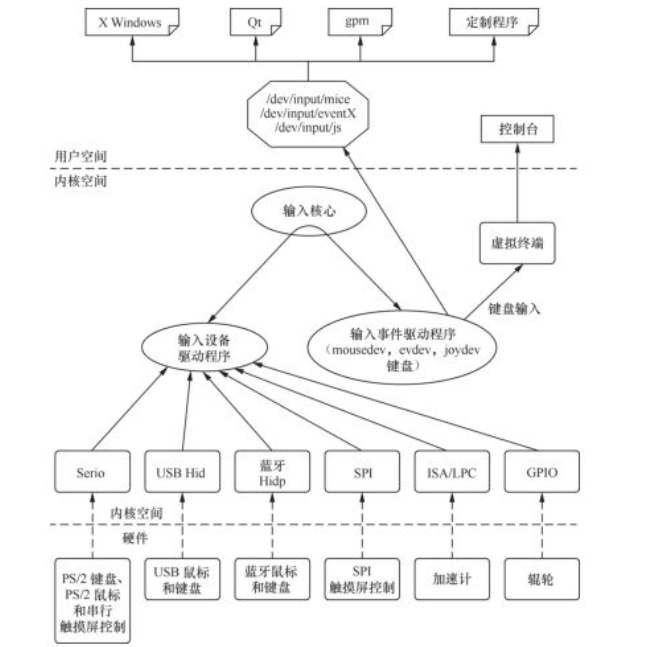1
2
3
4
5
6
7
8
9
10
11
12
13
14
15
16
17
18
19
20
21
22
23
24
25
26
27
28
29
30
31
32
33
34
35
36
37
38
39
40
41
42
43
44
45
46
47
48
49
50
51
52
53
54
55
56
57
58
59
60
61
62
63
64
65
66
67
68
69
70
71
72
73
74
75
76
77
78
79
80
81
82
83
84
85
86
87
88
89
90
91
92
93
94
95
96
97
98
99
100
101
102
103
104
105
106
107
108
109
110
111
112
113
114
115
116
117
118
119
120
121
122
123
124
125
126
127
128
129
130
131
132
133
134
135
136
137
138
139
140
141
142
143
144
145
146
147
148
149
150
151
152
153
154
155
156
157
158
159
160
161
162
163
164
165
166
167
168
169
170
171
172
173
174
| ...
static int gpio_keys_probe(struct platform_device *pdev)
{
struct device *dev = &pdev->dev;
const struct gpio_keys_platform_data *pdata = dev_get_platdata(dev);
struct fwnode_handle *child = NULL;
struct gpio_keys_drvdata *ddata;
struct input_dev *input;
int i, error;
int wakeup = 0;
if (!pdata) {
pdata = gpio_keys_get_devtree_pdata(dev);
if (IS_ERR(pdata))
return PTR_ERR(pdata);
}
ddata = devm_kzalloc(dev, struct_size(ddata, data, pdata->nbuttons),
GFP_KERNEL);
if (!ddata) {
dev_err(dev, "failed to allocate state\n");
return -ENOMEM;
}
ddata->keymap = devm_kcalloc(dev,
pdata->nbuttons, sizeof(ddata->keymap[0]),
GFP_KERNEL);
if (!ddata->keymap)
return -ENOMEM;
input = devm_input_allocate_device(dev);
if (!input) {
dev_err(dev, "failed to allocate input device\n");
return -ENOMEM;
}
ddata->pdata = pdata;
ddata->input = input;
mutex_init(&ddata->disable_lock);
platform_set_drvdata(pdev, ddata);
input_set_drvdata(input, ddata);
input->name = pdata->name ? : pdev->name;
input->phys = "gpio-keys/input0";
input->dev.parent = dev;
input->open = gpio_keys_open;
input->close = gpio_keys_close;
input->id.bustype = BUS_HOST;
input->id.vendor = 0x0001;
input->id.product = 0x0001;
input->id.version = 0x0100;
input->keycode = ddata->keymap;
input->keycodesize = sizeof(ddata->keymap[0]);
input->keycodemax = pdata->nbuttons;
/* Enable auto repeat feature of Linux input subsystem */
if (pdata->rep)
__set_bit(EV_REP, input->evbit);
for (i = 0; i < pdata->nbuttons; i++) {
const struct gpio_keys_button *button = &pdata->buttons[i];
if (!dev_get_platdata(dev)) {
child = device_get_next_child_node(dev, child);
if (!child) {
dev_err(dev,
"missing child device node for entry %d\n",
i);
return -EINVAL;
}
}
error = gpio_keys_setup_key(pdev, input, ddata,
button, i, child);
if (error) {
fwnode_handle_put(child);
return error;
}
if (button->wakeup)
wakeup = 1;
}
fwnode_handle_put(child);
error = input_register_device(input);
if (error) {
dev_err(dev, "Unable to register input device, error: %d\n",
error);
return error;
}
device_init_wakeup(dev, wakeup);
return 0;
}
static void gpio_keys_shutdown(struct platform_device *pdev)
{
int ret;
ret = gpio_keys_suspend(&pdev->dev);
if (ret)
dev_err(&pdev->dev, "failed to shutdown\n");
}
static int __maybe_unused gpio_keys_suspend(struct device *dev)
{
struct gpio_keys_drvdata *ddata = dev_get_drvdata(dev);
struct input_dev *input = ddata->input;
int error;
if (device_may_wakeup(dev)) {
error = gpio_keys_enable_wakeup(ddata);
if (error)
return error;
} else {
mutex_lock(&input->mutex);
if (input->users)
gpio_keys_close(input);
mutex_unlock(&input->mutex);
}
return 0;
}
static int __maybe_unused gpio_keys_resume(struct device *dev)
{
struct gpio_keys_drvdata *ddata = dev_get_drvdata(dev);
struct input_dev *input = ddata->input;
int error = 0;
if (device_may_wakeup(dev)) {
gpio_keys_disable_wakeup(ddata);
} else {
mutex_lock(&input->mutex);
if (input->users)
error = gpio_keys_open(input);
mutex_unlock(&input->mutex);
}
if (error)
return error;
gpio_keys_report_state(ddata);
return 0;
}
static SIMPLE_DEV_PM_OPS(gpio_keys_pm_ops, gpio_keys_suspend, gpio_keys_resume);
static const struct of_device_id gpio_keys_of_match[] = {
{ .compatible = "gpio-keys", },
{ },
};
static struct platform_driver gpio_keys_device_driver = {
.probe = gpio_keys_probe,
.shutdown = gpio_keys_shutdown,
.driver = {
.name = "gpio-keys",
.pm = &gpio_keys_pm_ops,
.of_match_table = gpio_keys_of_match,
.dev_groups = gpio_keys_groups,
}
};
static int __init gpio_keys_init(void)
{
return platform_driver_register(&gpio_keys_device_driver);
}
static void __exit gpio_keys_exit(void)
{
platform_driver_unregister(&gpio_keys_device_driver);
}
|
